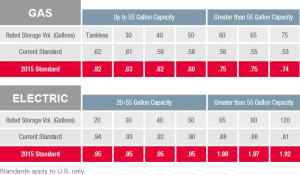New water heaters promise big energy bill savings, as well as big benefits for the planet
After heating and cooling, the average American household expends most of its energy on heating water. The good news is that new Department of Energy efficiency standards went into effect for water heaters in April of this year. This means that if you’re in the market for a new water heater, you could cut down your energy use by up to 47%.
This change will help consumers save about $63 billion in energy bills and eliminate about 172.5 million metric tons of carbon dioxide emissions over the next 30 years. According to the DOE, this is equivalent to removing 33.8 million cars from the roads for an entire year.
How can you benefit from this change? Well, if your water heater is nearing the end of its life (average lifecycle varies, but somewhere between 10 and 20 years can be assumed), be sure to purchase a new one that is compliant with these new standards. Manufacturers are allowed to continue selling non-compliant models until the stock is depleted, so you can still buy the previous generation. However, as of April 2015, only compliant models can be manufactured.
What Are The Guidelines?
Boiled down to the simplest measure, these new guidelines require electric water heaters with a capacity of 55 gallons or less to have an energy factor (EF) of 0.95 (previously it was 0.9), and large tanks, with a capacity of 56 gallons or more, to have an EF of 2.0 (previously 0.86). The EF is a metric that compares the energy conversion efficiency of residential appliances. EF is used in rating dishwashers, clothes washers and dryers, as well as water heaters. The higher the EF, the more efficient the unit.

Source: rheem.com
How Will This Impact Me?
This leap in energy efficiency will impact homeowners in two ways. The new requirements have resulted in water heater manufacturers essentially redesigning their products to achieve the new EF. Smaller water heaters will see a slight increase of 4% efficiency, mainly through improving insulation. But it’s the larger tanks where the biggest energy savings will come. To meet the new standards, manufacturers are incorporating heat pump or gas condensing technology, both of which use self-produced energy to help heat the water. Heat pump water heaters reduce an electric water heater’s consumption by about 50%, whereas gas condensers reduce the already-more-efficient gas water heater’s consumption by 25%. This can save an average household almost $300 per year on its electricity bills, or $100 year off the gas bill.
What’s the Catch?
This redesign means that water heaters are getting bigger, so if you are buying a new one you may find that you’ll need to downsize the capacity of your tank to fit in the current space, or re-design the space. If a major redesign becomes a factor, you might want to consider switching to a tankless water heater. Tankless water heaters, otherwise known as on-demand heaters, heat water instantly and therefore have no need for a large tank of water. This means they have a much smaller footprint than a tank model, and can even be installed outside in some climates. Most tankless heaters already meet energy efficiency guidelines. Whole-home tankless water heaters use less energy than tank heaters because they only heat water when it’s needed, not constantly, as with a tank heater. Traditionally, tankless models have been more expensive than tank water heaters, but because energy efficiency improvements are driving up the prices of tank water heaters, tankless models are beginning to compete on price.
Conserve Water, Conserve Energy
Whichever water heater you choose, remember that you should be looking to conserve water as well. Start taking shorter showers or use the on-off method (turn the water off when shampooing, then back on again). Also, install low-flow showerheads and inexpensive aerators in all your faucets to cut down on the amount of water you use for everyday tasks such as washing dishes and brushing your teeth. If we all take these small steps, combined with the increase in energy efficiency of an improved water heater, we can collectively make a very big reduction in our energy and water needs.
Guest blog submitted by Jennifer Tuohy who writes about new energy efficiency developments in the home for The Home Depot.